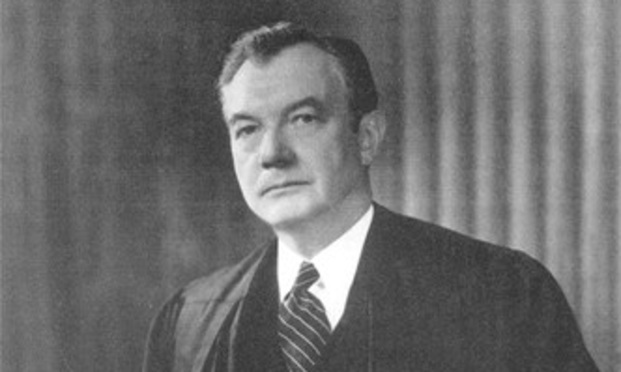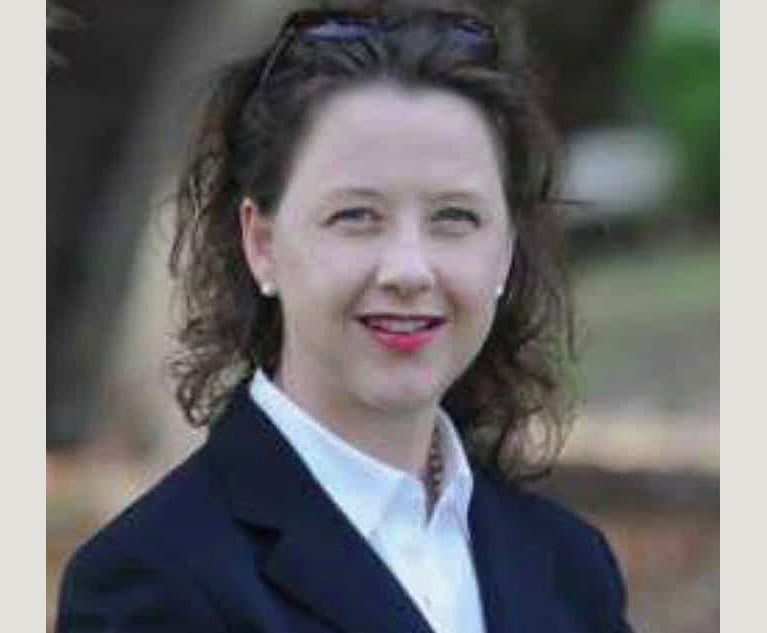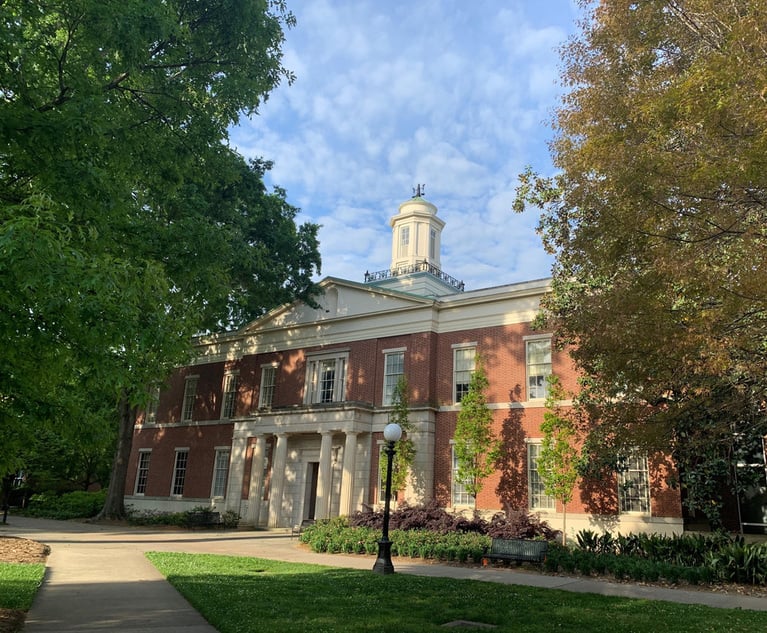Wedding Cake, National Anthem Battles Keep High Court's Pledge Decision Relevant After 75 Years
Amid a world war against fascist governments, the Barnette court held that the First Amendment meant the government couldn't force people to say something against their will.
May 24, 2018 at 01:27 PM
5 minute read

Flag Day on June 14 will be the 75th anniversary of the U.S. Supreme Court's decision in West Virginia State Board of Education v. Barnette. In that decision, the justices reversed the court's three-year-old precedent that the state could force schoolchildren to say the Pledge of Allegiance and salute the flag—even if their religious views considered the pledge idolatry.
The Barnette decision was important because it helped end years of abuse Jehovah's Witnesses suffered in the wake of the 1940 decision, Minersville School District v. Gobitis. It held religious freedom didn't trump the school board's ability to decide what's best for achieving its goals.
Amid a world war against fascist governments, the Barnette court held that the First Amendment meant the government couldn't force people to say something against their will.
The 1943 case is highly relevant today. The majority opinion by Justice Robert Jackson has been quoted often in light of criticism of athletes who kneel during the national anthem to protest police violence: “If there is any fixed star in our constitutional constellation, it is that no official, high or petty, can prescribe what shall be orthodox in politics, nationalism, religion, or other matters of opinion, or force citizens to confess by word or act their faith therein. If there are any circumstances which permit an exception, they do not now occur to us.”
The decision isn't just useful for liberals. In a pending Supreme Court case, the Trump administration cited Barnette in arguing that Colorado can't force a baker to make a custom wedding cake for a gay couple. The government argued that Barnette prohibits laws that “compel expression,” which in this case would be the plaintiff's wedding cake.
The government's reliance on Barnette in the wedding cake case “reminds us of how powerful Barnette is,” said Michael Broyde, a rabbi and Emory University law professor.
Shawn Francis Peters, who teaches at the University of Wisconsin's integrated liberal studies program, wrote “Judging Jehovah's Witnesses: Religious Persecution and the Dawn of the Rights Revolution.” His 2000 book details the mob violence against Jehovah's Witnesses after the court's 1940 decision and the judges and lawyers who turned the Supreme Court around only three years later.
Peters answered a few questions from the Daily Report about the Barnette anniversary and the decision's relevance.
What do you think of Barnette coming up in the news this fall in such different contexts—in the NFL controversy and the gay wedding case?
To be honest, I am not surprised that the Barnette decision, and the context in which it arose, keep coming up all these years later. The case dealt with profoundly important issues of individual conscience and state power, and those continue to be vexing issues in American society. The parallels aren't always perfect, but it's not difficult to see myriad connections between these episodes. Both the Jehovah's Witnesses and professional athletes attempted to resist compulsory patriotic rituals for reasons of conscience, and in both cases the public reaction was fierce.
Could you imagine what Justice Jackson would think of these two developments?
Justice Jackson wasn't naive about the passions aroused by rituals connected to the American flag, and I don't think he would be especially surprised to see that compulsory patriotic ceremonies remain controversial. I don't want to speculate too much, but I doubt that he believed his opinion in Barnette would be the final word on the subject.
It seems that many of our controversies today still are about federalism—whether a state has the right to do what it wants over the wishes of the prevailing federal government. Could you comment on that?
In the contemporary context, I honestly don't think that ideas about federalism play much of a role in these controversies. Granted, such issues legitimately come up when cases are argued in court, but I mainly see the public conversation being dominated by visceral reactions rather than legal reasoning.
How much do you think the court's reversal from Gobitis to Barnette was influenced by anti-Jehovah's Witness violence, opposition to fascism or just a better argument focused on free speech rather than on freedom of religion?
I think that a convergence of factors influenced the court's rapid reversal of Gobitis. The public response to the decision was unprecedented in terms of helping to sanction oppression of a minority group. And the court itself was severely criticized for having failed to safeguard civil liberties. There were internal squabbles and personnel shifts as well, including the addition of Justice Jackson to the court. So there was kind of a perfect storm to push the court in a different direction.
This content has been archived. It is available through our partners, LexisNexis® and Bloomberg Law.
To view this content, please continue to their sites.
Not a Lexis Subscriber?
Subscribe Now
Not a Bloomberg Law Subscriber?
Subscribe Now
NOT FOR REPRINT
© 2025 ALM Global, LLC, All Rights Reserved. Request academic re-use from www.copyright.com. All other uses, submit a request to [email protected]. For more information visit Asset & Logo Licensing.
You Might Like
View All

Ex-Prosecutor’s Trial Ends as Judge Throws Out Her Felony Indictment in Ahmaud Arbery Death Case


Ex-Prosecutor Denies on Witness Stand That She Tried to Protect Ahmaud Arbery's Killers
Trending Stories
- 1Buyer Beware:Continuity of Coverage in Legal Malpractice Insurance
- 2‘Listen, Listen, Listen’: Some Practice Tips From Judges in the Oakland Federal Courthouse
- 3BCLP Joins Saudi Legal Market with Plans to Open Two Offices
- 4White & Case Crosses $4M in PEP, $3B in Revenue in 'Breakthrough Year'
- 5Thursday Newspaper
Who Got The Work
J. Brugh Lower of Gibbons has entered an appearance for industrial equipment supplier Devco Corporation in a pending trademark infringement lawsuit. The suit, accusing the defendant of selling knock-off Graco products, was filed Dec. 18 in New Jersey District Court by Rivkin Radler on behalf of Graco Inc. and Graco Minnesota. The case, assigned to U.S. District Judge Zahid N. Quraishi, is 3:24-cv-11294, Graco Inc. et al v. Devco Corporation.
Who Got The Work
Rebecca Maller-Stein and Kent A. Yalowitz of Arnold & Porter Kaye Scholer have entered their appearances for Hanaco Venture Capital and its executives, Lior Prosor and David Frankel, in a pending securities lawsuit. The action, filed on Dec. 24 in New York Southern District Court by Zell, Aron & Co. on behalf of Goldeneye Advisors, accuses the defendants of negligently and fraudulently managing the plaintiff's $1 million investment. The case, assigned to U.S. District Judge Vernon S. Broderick, is 1:24-cv-09918, Goldeneye Advisors, LLC v. Hanaco Venture Capital, Ltd. et al.
Who Got The Work
Attorneys from A&O Shearman has stepped in as defense counsel for Toronto-Dominion Bank and other defendants in a pending securities class action. The suit, filed Dec. 11 in New York Southern District Court by Bleichmar Fonti & Auld, accuses the defendants of concealing the bank's 'pervasive' deficiencies in regards to its compliance with the Bank Secrecy Act and the quality of its anti-money laundering controls. The case, assigned to U.S. District Judge Arun Subramanian, is 1:24-cv-09445, Gonzalez v. The Toronto-Dominion Bank et al.
Who Got The Work
Crown Castle International, a Pennsylvania company providing shared communications infrastructure, has turned to Luke D. Wolf of Gordon Rees Scully Mansukhani to fend off a pending breach-of-contract lawsuit. The court action, filed Nov. 25 in Michigan Eastern District Court by Hooper Hathaway PC on behalf of The Town Residences LLC, accuses Crown Castle of failing to transfer approximately $30,000 in utility payments from T-Mobile in breach of a roof-top lease and assignment agreement. The case, assigned to U.S. District Judge Susan K. Declercq, is 2:24-cv-13131, The Town Residences LLC v. T-Mobile US, Inc. et al.
Who Got The Work
Wilfred P. Coronato and Daniel M. Schwartz of McCarter & English have stepped in as defense counsel to Electrolux Home Products Inc. in a pending product liability lawsuit. The court action, filed Nov. 26 in New York Eastern District Court by Poulos Lopiccolo PC and Nagel Rice LLP on behalf of David Stern, alleges that the defendant's refrigerators’ drawers and shelving repeatedly break and fall apart within months after purchase. The case, assigned to U.S. District Judge Joan M. Azrack, is 2:24-cv-08204, Stern v. Electrolux Home Products, Inc.
Featured Firms
Law Offices of Gary Martin Hays & Associates, P.C.
(470) 294-1674
Law Offices of Mark E. Salomone
(857) 444-6468
Smith & Hassler
(713) 739-1250






